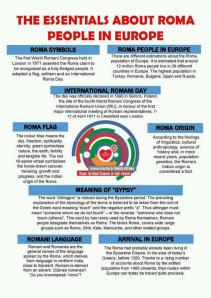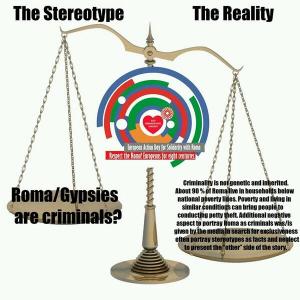Papusza suffered for the song of her people, but what if we all sang at once?
Today we celebrate the Roma. We celebrate the plates of food we leave for our ancestors to keep them loved and fed even in death. We cover mirrors, TV and computer screens, and bowls of water after someone dies, just long enough so that they are not trapped by their own reflection as they pass through the veils. We keep our homes and our bodies meticulously clean because the world is split into that which is pure and impure. The spirit is pure; that’s what we want to be. We believe in kintala, or karma, because what we do matters and we mean to do good. We love The Goddess of Fate and her many names and forms, Sati-Sara, Sara Kali, St. Sarah, The Black Madonna; and we believe in free will.
We remind you that “Roma” is our preferred term, not “Gypsy,” a name that has been turned against us, warped into “gypped,” gyppo,” and the lowercase “gypsy,” the one that doesn’t recognize us as a proper noun, never mind a proper ethnic group. We celebrate that some of us chose to reclaim the word as we wish. We remind you that we, as a culture, are fractured by distance, persecution, and illegal deportation, and we are working to unify, to overcome discord and fight for our basic human rights. We celebrate that we are not homogenous and yet, we are united by our origin. We came from India, migrated in the 11th century, and the Rromanes (Romani language) root is Sanskrit. We are different clans—Kale, Kalderash, Lovara, Sinti, Manouche, Vlach, and many more, all with unique customs, dialects, and worldviews. We are individuals: rich, poor, artists, lawyers, blacksmiths, fortune tellers, musicians, doctors, dancers, mechanics, horse dealers, car dealers, janitors, politicians, activists, writers, professors, actors, executives, beggars, volunteers, producers, landlords, and linguists. Opre Roma: we rise up. We are loving friends, partners, parents, brothers, sisters, sons, and daughters. To say “I love you” we say, “I eat your heart” or “I eat your belly” because love is voracious and can never be close enough.
My grandmother survived WWII Germany as a Romani woman. Now she likes to say, “I am a weed. No one wanted me, they tried to destroy me, but I grew. I am a weed and I’m proud. And I’ve always liked weeds best, anyway. Wild, strong, and very pretty.”
Today we raise awareness that half of Europe’s Romani population died in the Holocaust, what we call O Porrajmos (The Great Devouring), and 2 million Romani lives lost is a modest estimation. We are rarely invited to or acknowledged in Holocaust remembrances or memorials. Sometimes we are not even allowed in the gates. We remind you that Roma were slaves alongside African Americans in the United States, and in the Balkans for four centuries. We are forcibly sterilized in Europe and the U.S., alongside Native Americans and African-Americans. We remind you that the government takes Romani children in the United States and Europe from their families because it is assumed that Roma cannot be decent, loving parents. We remind you that America has “Gypsy Crime” task forces that decide Romani fortune tellers are scammers and white fortune tellers are not. America, the country that swears to the flag not to indulge in racial profiling, blatantly profiles its Roma, just like Europe. We remind you that skinheads set Romani encampments on fire across Europe with Molotov cocktails, burning men, women, and children in their beds. We remind you of the Jobbik Party. Roma are forced into camps with no running water, waste management, electricity, or shelter. Roma are denied a right to education, or forced into special education classes because it is assumed we are mentally deficient. Amnesty calls the Romani human rights crisis “Europe’s shame,” and Roma endure hate crimes, are not allowed in shops, and are kicked out of countries because the politicians believe we cannot assimilate, that we are vermin, that Hitler didn’t kill enough of us. We remind you that Roma say, “Fuck you, Fascists. We rise up.” You learned none of this in school.










